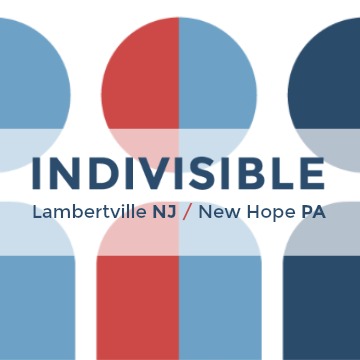Contributed by Sharon M. Hallanan.
Imagine working on a project that you care about so deeply that you devote your entire life to it. You dive into it with great passion, and even get arrested for breaking rules that are demonstrably unjust and unfair.
If you tuned in to last month’s Indivisible Zoom Community Gathering, you heard me speak with deep admiration and respect for Congressman John Lewis, who died on July 17, after a lifetime of fighting for voting rights, among other important civil rights and progressive causes.
But although that opening paragraph well describes the life led by Congressman John Lewis, it also describes the fierce fighters for women’s suffrage. Women whose names you may know, and many, many, many others, worked tirelessly for many long years to try to secure women’s right to vote.
This year, and this month particularly, we’re celebrating a significant milestone in that fight – the ratification of the 19th Amendment to the U.S. Constitution, which states simply that regarding the citizen’s right to vote, the United States and each of the individual States are prohibited from discriminating on the basis of sex.
That amendment became officially part of the Constitution on August 26. 1920, so certainly on August 26 this year, we should celebrate! But to truly appreciate that milestone, let’s realize how very hard fought a victory it was.
You’ve all heard of Susan B. Anthony, right? Did you know that she, and Elizabeth Cady Stanton, and Sojourner Truth, all worked for decades to advocate for women’s right to vote, and yet none of them lived long enough to ever legally vote? They each tried anyway, but were turned away, and Anthony was arrested for her attempt. She adamantly refused to ever pay the fine! Stanton and Anthony worked together on suffrage issues for 50 years – would you have persevered that long? It’s a sad truth regarding the 1848 Women’s Rights Convention in Seneca Falls, NY, that of the 68 women attendees who signed that Convention’s Declaration of Sentiments, only Charlotte Woodward was alive on Election Day 1920, and at age 91, she was ill that day, bedridden and unable to vote.
Not surprisingly, when Alice Paul of New Jersey began working in the U.S. women’s suffrage movement in 1910, after having worked in the suffrage movement in England, she took a single-minded approach to the task. Recognizing the many important social issues that the suffragists before her had tackled simultaneously, Paul was committed to focus solely on voting, and to seek to amend the Constitution to secure that right for women. She organized the massive 1913 suffrage parade in Washington, D.C., and led the Silent Sentinels, the group of women who in 1917 picketed daily in front of the White House to demand the right to vote. These women faced arrests and imprisonment, and went on hunger strikes, to keep the suffrage issue in the forefront of public attention and demand change.
As in so many things, the suffrage issue was much more difficult and complex for African American women. They wanted equal voting rights, but had many other fundamental issues to address too. With life-or-death battles against slavery and lynching, they could not afford limiting their energies solely to voting rights, but they did work hard on that issue, despite facing racist attitudes, including from other suffragists. They were aware that the 19th Amendment’s ratification would be only a beginning to securing voting equality. They saw that Black men, who should have had secure voting rights since the 15th Amendment’s ratification in 1870, were instead denied full voting rights with poll taxes, reading tests, and other racist challenges. Therefore, through the National Association of Colored Women and other such Black women’s clubs, which had been formed as early as 1793, Black women fought for voting equality from long before 1920, and continued through the adoption of the Voting Rights Act in 1965 and beyond.
So much struggle, so many setbacks, over so many decades. But, nevertheless, women persisted. And slowly but steadily, it has made a profound impact, with currently more than 100 women in Congress, a woman serving as Speaker of the House, and a woman nominee for Vice President on the Democratic ticket in 2020. If you agree that this representation makes a big difference in how public policies are crafted and in how society views the potential of women and girls, please help spread the word that August 26, officially designated by Congress as “Women’s Equality Day,” is a wonderful day worthy of celebration. And I think that the best way to truly celebrate this achievement is to VOTE, VOTE, VOTE – in every election, every year!



